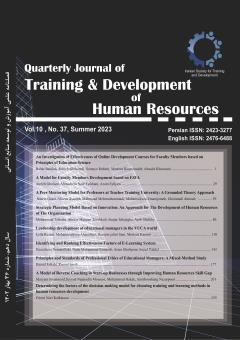Principles and Standards of Professional Ethics of Educational Managers: A Mixed-Method Study
Subject Areas :hamid falahi 1 , rasoul saedi 2 *
1 - Master's degree in educational management of Kurdistan University
2 - phd student in the educational management field of Boali Sina University, Hamadan, responsible author.
Keywords: principles and standards, professional ethics, managers and assistant professors,
Abstract :
This study seeks to investigate and discover the principles and standards of professional ethics for educational managers along with the related challenges. The research approach was quantitative-qualitative (mixed method). The statistical population in the qualitative phase included the principals of boys' high schools in one district of Sanandaj (Iran). Consequently, 8 individuals were selected as the study sample using the purposeful sampling method and phenomenological strategy. The study data were collected through conducting interviews including open-ended questions. The findings revealed: a) the concepts of professional ethics that educational managers adhere to with regard to the specific regulations of a profession, religious principles and values, and social norms; b) principles such as self-management, having a vision, professional capabilities, respect, commitment, and responsibility in the job; c) challenges such as structural challenges (lack of comprehensive standard, contradiction between administrative regulations, centralized management, ambiguity of goals) and individual challenges (passivity, limited visions). In order to collect the data, interviews were conducted with managers to obtain their views toward principles and standards of professional ethics, and they were asked if they adhere to these principles. Next, the data obtained from interviews were compiled and implemented in the form of a researcher-made questionnaire which was divided into two aspects: occupational principles and the other pedagogical principles. In the quantitative phase, the community (n=283) included all the teachers, assistants, and principals of boys' high schools in one district of Sanandaj. Using convenience sampling method, 163 individuals were selected as the study sample. Confirmatory factor analysis, one-sample t-test, and Friedman's test were used for data analysis. Finally, according to the results of the one-sample t-test, higher than average level of commitment was reported for managers. Also, the researcher-made questionnaire. Additionally, the results obtained through the questionnaire confirmed the results of the interviews.
ابطحی، حسین. (1383). مدیریت منابع انسانی، مؤسسهی تحقیقات و آموزش مدیریت، کرج: چاپ سوم.
باقری، خسرو؛ بیرونی کاشانی، راضیه. (1380). چرا معلمان به آموختن فلسفه تعلیم و تربیت نیاز دارند؟ مجله روانشناسی و علوم تربیتی، 31 (2)، 123-138.
قرا ملکی، احد فرامرز؛ درخشانی، لعبت؛ رضایی، سعید. (1391). اخلاق حرفهای در کتابداری و اطلاعرسانی، چاپ دوم، قم: سمت.
قراملکی، احد فرامرز. (1385). تهران، انتشارات مجنون، چاپ سوم
کاظمی، مهرداد. (1390). بررسی رابطهی بین مؤلفههای اخلاق حرفهای و احساس موفقیت در عملکرد مدیران آموزشی دبیرستانهای شهر تهران، پایاننامهی دانشگاه پیام نور تهران،
طاهری عطار, غزاله, پوراحمدی, معین, هراتی, مسعود. (1400). تحلیل اثر اخلاق حرفهای بر عملکرد شغلی و اعتماد سازمانی با میانجیگری جو اخلاقی. پژوهش نامه مدیریت تحول, 11(1), 27-56
میرکمالی، سید محمد. (1389). رهبری و مدیریت آموزشی، انتشارات دانشگاه تهران.
ورنو، روژه. (1372). نگاهی به پدیدارشناسی و فلسفههای هست بودن. ترجمهی یحیی مهدوی، خوارزمی
Davis, M. (2001). Ethics and University, London, Rutledge
Fattah, M. (2014), Professional Ethics and Public Administration in the United States, International Journal of Public Administration, 69.
Karlin, B. (2014). An Analysis of Principal Preparation Programs at and Theses (ETDs). Paper 1934.
Naagarazan, R. (2006). A Textbook on Professional Ethics and Human Values, New Delhi, Bangalor
Pennsylvania State Schools, Seton Hall University Dissertations
Reybold, E. Halx, M. Jimenez, A. (2008). Professional Integrity in Higher Education A Study of in Student Affairs, College Student Administrative Staff Ethics Development, 110-122
Rissanen, I., Kuusisto, E., Hanhimäki, E., & Tirri, K. (2020). The implications of teachers’ implicit theories for moral education: A case study from Finland. Journal of Moral Education; 47 (1), 63-77.
Shapira - Lishchinsky, o. (2020). The implicit meaning of TIMSS: Exploring ethics in teachers’ practice. Teaching and Teacher Education, 79 (1), 188 -197.
Soleimani, N., & Lovat, T. (2020). The cultural and religious underpinnings of moral teaching according to English language teachers’ perceptions: a case study from Iran. Journal of Beliefs & Values, 40 (4), 477-489.
Sethuraman, K. (2006). Professionalism in Medicine. Journal of Regional Health Forum 10, (1). 1-10
Van Nolands, S. (2009). Teacher cods: learning from experience, international instatute for education planning. 23, 70-71.
Virginia, G. (2010). Emerging Technology Trends and Ethicl Practices for The School Principal, Educational Technology System, Vol. 38(1) 39-50

